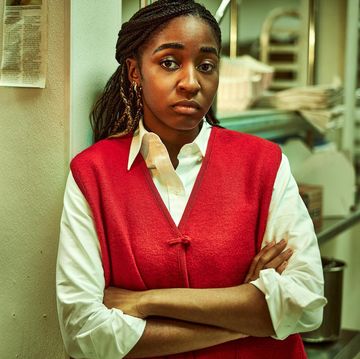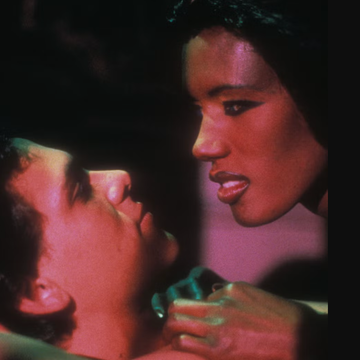For Bazaar’s Possibility issue, we asked some of the most energizing personalities in Hollywood, music, and fashion to model some of spring’s most exciting looks. Among them, Romeo + Juliet star Tommy Dorfman. See the full photo shoot here, and read Dorfman’s interview below.
Tommy Dorfman’s smile cuts through the gray December gloom on the day of our interview when she asks me, “Did you enjoy my death?” The actress is sitting in her Brooklyn apartment wearing a gray sweatshirt blooming with vivid florals, a warm and lively contrast to the question she just posed. But the truth is, I did.
The death she’s referring to is her character’s dramatic demise in Sam Gold’s audacious new Broadway production of Romeo + Juliet, running through February 13. Aimed squarely at a Gen-Z audience, the play retains Shakespeare’s original language and plot but gives it a modern Euphoria-like twist. Think baggy jeans, sparkling minis, and moody club lighting, all underscored by a pulsating soundtrack curated by Jack Antonoff. The cast is also led by two buzzy Gen-Zers: Hearstopper’s Kit Connor and West Side Story’s Rachel Zegler play the titular star-crossed lovers.
Dorfman, who became a generational touchstone for her role as Ryan Shaver in Netflix’s 2016 teen coming-of-age series 13 Reasons Why, expertly portrays two highly disparate parts in Gold’s reimagining: Tybalt, the fiery cousin of Juliet whose violent death at the hands of Romeo is a pivotal moment in the tragedy; and the Nurse, Juliet’s tender confidante and caregiver, a role that demands a different kind of emotional range. Every performance, Dorfman must endure the mental and physical toll of being slain on stage, then quickly shake off the weight of that loss and step back into the maternal embrace of the Nurse. The way she moves between the roles is a testament to not only her range, but her endurance.
For Dorfman, who has dreamed of Broadway since the age of four but waited cannily until the moment was right, it’s the project of a lifetime. It also marks her return to acting in a significant way since her transition, which she publicly announced in an interview in Time magazine in 2021. During her hiatus, Dorfman made her directorial debut with the 2024 feature film adaptation of the YA novel I Wish You All the Best. (A second film, an adaptation of the graphic novel Laura Dean Keeps Breaking Up with Me, is also on the horizon.) Somehow, she also found the time to write her memoir, Maybe This Will Save Me, due in May.
For Bazaar’s Possibility issue, Dorfman spoke about the unrivaled thrill of Shakespeare, what fuels her creative drive, and finding hope in the presence and work of other queer artists.
Why was Romeo + Juliet, and specifically this production of it, the right project for you to make your return to acting in?
It really felt quite kismet. I really didn't want to come back to acting until it was on stage with a director that I felt safe and excited about working with. I wanted to do theater because I felt like I would have more room to explore, fewer barriers. I haven't acted since I transitioned, so I was feeling trepidatious. I didn't want to do or play the same roles I had been playing prior to transitioning. After I came out publicly, I had still had offers to act, but it was as if they took the "gay assistant" characters or the "gay best friend" characters I had been playing, made them trans, and sent them to me. I was like, Well, that's no fun.
So when my agent sent me the Romeo + Juliet audition, I immediately knew that I wanted to pursue it, because I love [director] Sam Gold. I knew that I had a lot to learn from him as a director. I've never had a director trust me in the way that Sam has; he saw me and believed that I could do what I’ve known I’m capable of. I also really love Shakespeare. I knew that this play specifically would breathe fresh life into my creative world, both as an actor and as a storyteller.
You play both Tybalt and the Nurse, two characters who are traditionally not played by the same actor. How did that happen?
I went through a Rolodex of different characters throughout the audition process. At first, it was Benvolio, and then it was Tybalt, and then we landed on the Nurse, and then Sam had this idea that maybe I could be Tybalt and the Nurse. We talked about what that might mean on a stamina level, on an emotional endurance level, and if it would even make sense in the play. I'm so grateful that he decided it did because the minute I started playing around with both roles—two vastly different characters in Shakespeare's world—I felt an immediate ease. In my role as the Nurse, I was really interested in exploring maternity and that kind of unfiltered love for somebody else—the desire to be of service to somebody else's wish fulfillment, even if it goes terribly wrong. And for Tybalt, I was really interested in exploring violence, combativeness, pride, and an insatiable need to win and prove something. It's an unrivaled experience to fight and die and come back to life and grieve death and get married all in a weekend.
The show sounds incredibly physically and emotionally demanding.
I really underestimated how physical this play was going to be. There's very specific movement direction from [choreographer] Sonya Tayeh. There's intimacy work. There's fight choreography. And Sam did ask me, “Are you comfortable fighting? How will you feel about dying eight times a week?” And I was like, “Yeah, I'm totally comfortable with all that.” I'm super athletic, but it was still a shock to the system. Broadway—especially a play or musical like this—is a sport. It is about endurance. Nicole Scherzinger recently said it best when she said that it’s the Olympics of acting.
Has being in the show cracked open new possibilities for your own career?
To get to be on Broadway is the biggest honor of my career. It’s one thing to dream of or hope for something but to actually be in the practice of it is still quite surprising. It shocks me every day. And to get to do it in Sam Gold's rendition of Romeo + Juliet—it's just wild to me. I really do feel like I can do anything now as an actor. I was always really interested in character work but method acting doesn't interest me. I'm not interested in that complete self-sacrifice into a role. I'm interested in working as an actor in a safe way that is based in imaginative circumstances where I get to meet characters that are very different than myself, and then transform into them. Getting to flip between two characters every night gives me a lot of confidence about my ability to continue working as an actor in the future.
You’ve also begun to direct. You’ve completed one film and are working on a second. What made you want to get behind the camera?
I’ve always wanted to direct theater and film and TV. In my early 20s, I needed to pick a focus to really pursue, and that's why I ended up acting first, specifically in TV and film. I was pursuing that before pursuing a professional career in theater, because I felt like I would get to go do theater if I had a successful enough career on TV and film without having to go to grad school. By season one of 13 Reasons Why, I’d already written one film screenplay, half of another, and a TV pilot.
I was able to get the rights to I Wish You All the Best, which is the book my first film is based on. It's a coming-of-age story set in the South about a non-binary kid. I wrote the script myself during the pandemic, when I was transitioning in a lot of different ways. I knew that I would have a truthful perspective on what it was like to grow up trans in the South and I was also interested in reliving high school—a bold choice! [Laughs] I was too focused on being an adult when I was in high school so in making that movie, I was trying to understand what it could have been like if I wasn't a drug addict, if I went to class, if I had normal friendships and relationships.
Directing for me comes purely out of a desire to tell stories that haven't been told and write characters that haven't been seen. I've been told no so many times, that my experience isn't commercially viable, that trans people aren't commercially viable, that different types of love and romance and heroes and villains aren't commercially viable. And I don't like that. So, for me, it's really a pursuit of proving people wrong.
You’re also releasing a memoir in May called Maybe This Will Save Me. What made you want to excavate and write about your past?
Honestly, I was transitioning. It was the pandemic. I needed money, I needed to support myself, and I started investigating my life. I've been in recovery for 11 years. I've never really talked about it, but it's something I've always wanted to write about when I felt I had enough perspective to do so. I've always tried to find things to take me out of my body, out of myself, out of the present. That’s where the title came from: Maybe This Will Save Me. It’s a mantra that I've had my whole life. Like, maybe this boy or this girl or this move or this apartment or this dog or this handbag or this drug or this drink or this job or this Eat, Pray, Love trip will save me. I've always been seeking and searching, and I found that the things that helped me feel less alone [when I was younger] were books by David Sedaris and Augusten Burroughs and the other queer authors that I had access to at the time. I knew that there was stuff from my teenage years—a lot of this book takes place in that time in my life—that if I was willing to share it, would maybe free me of it to some degree.
What possibilities do you want to create for others through your art?
If there's any legacy that I would like to leave behind, it would not be my name or the work that I've done, but that I was able to help other people sustain their own lives. When I think about my trans siblings specifically, and other young, marginalized artists that I know, my priority is finding ways to get those people paid for their work. There still aren't enough entry points into the industry, so I feel a responsibility to cultivate new ideas—and fail a million times along the way—in hopes that at some point, maybe in my 50s, 60s, 70s, I'll have helped even if marginally. It’s not going to happen today or tomorrow, but it's the thing that keeps me going when the world feels so dark and bleak and scary. I feel an immense amount of hope when I spend time with other queer artists and trans artists who are not giving up, who are continuing to forge new pathways to support themselves and our community.
This interview has been condensed and edited for clarity.



















